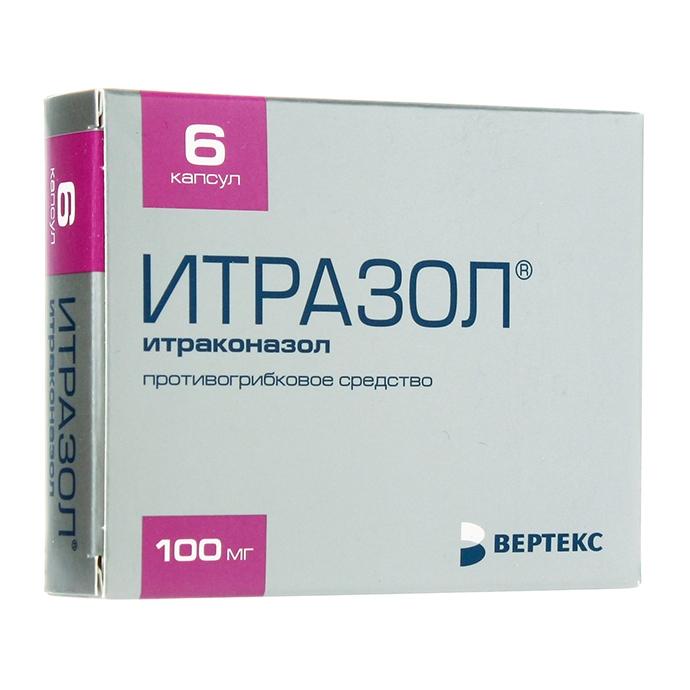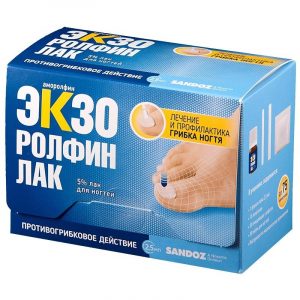Description
Packing
6 pcs
Indications
dermatomycosis
fungal keratitis
onychomycosis caused by dermatophytes and / or yeast and mold
systemic mycoses: systemic aspergillosis and candidiasis, cryptocystic fibrosis, cryptocystic fibrosis, cryptocystic fibrosis, cryptocystic fibrosis, cryptocystic fibrosis, cryptocystic fibrosis, cryptocystic fibrosis, cryptocystosis, candidiasis with damage to the skin or mucous membranes, including vulvovaginal candidiasis
pityriasis versicolor.
Contraindications
individual hypersensitivity to the drug or its components
simultaneous administration of drugs metabolized with the participation of the CYP3A4 enzyme: terfenadine, astemizole, misolastine, cisapride, dofetilide, quinidine, pimozimstin inhibit, , triazolam and midazolam (see Interaction )
pregnancy
lactation period
childhood (up to 3 years).
Precautions: severe heart failure of a liver disease (including those accompanied by liver failure). Itrazol ® is recommended for use in children over 3 years old only if the potential benefit outweighs the potential risk.
Special instructions
Women of childbearing age who take Itrazol ® must use adequate contraceptive measures throughout the course of treatment until the onset of the first menstruation after its completion.
When examining the iv dosage form of itraconazole, a transient asymptomatic decrease in the ejection fraction of the left ventricle was observed, normalizing until the next infusion of the drug.
Itraconazole has a negative inotropic effect. Cases of heart failure associated with itraconazole have been reported. Itraconazole should not be taken in patients with chronic heart failure or a history of the disease, unless the potential benefit significantly exceeds the potential risk.
BKK can have a negative inotropic effect, which can enhance the similar effect of itraconazole, itraconazole can reduce the metabolism of BKK. With the simultaneous administration of itraconazole and BCC, caution must be exercised.
With reduced gastric acidity, absorption of itraconazole is impaired. Patients taking antacids (e.g. aluminum hydroxide) are advised to use them no earlier than 2 hours after taking Itrazole ® capsules. Patients with achlorhydria or those using H2 histamine receptor blockers or proton pump inhibitors are advised to take Itrazole ® capsules with acidic drinks.
With prolonged use of itraconazole (more than 1 month), with itraconazole, it is recommended that patients receiving other drugs with hepatotoxic effects, as well as patients with liver diseases, regularly monitor liver function. Patients should be warned about the need to immediately contact their doctor in case of symptoms suggesting the onset of hepatitis, namely: anorexia, nausea, vomiting, weakness, abdominal pain and dark urine. In the event of such symptoms, it is necessary to immediately stop therapy and conduct a liver function test.
In patients with renal failure, the bioavailability of itraconazole may be reduced, therefore, dose adjustment is necessary.
Treatment should be discontinued if neuropathy occurs, which may be associated with taking Itrazole ® capsules. There is no evidence of cross-sensitivity to itraconazole and other azole antifungal drugs. Itrazol ® in capsules should be used with caution in patients with hypersensitivity to other azoles.
In patients with impaired immunity (AIDS, after organ transplantation, neutropenia), an increase in the dose of Itrazole ® may be required.
Side effects of
From the gastrointestinal tract: dyspepsia, nausea, abdominal pain and constipation, reversible increase in the activity of liver enzymes, cholestatic jaundice, hepatitis, anorexia. In very rare cases, with the use of Itrazol ®, severe toxic liver damage developed, including a case of acute liver failure with a fatal outcome.
From the side of the central nervous system: headache, fatigue, dizziness, peripheral neuropathy.
From the CCC: congestive heart failure and pulmonary edema.
From other organs and systems: menstrual irregularities, allergic reactions (such as itching, rash, urticaria and angioedema), Stevens-Johnson syndrome, alopecia, hypokalemia, edema, dark urine, hypercreatininemia.
Drug Interactions
drugs, affecting the metabolism of itraconazole
The interaction of itraconazole with rifampicin, rifabutin and phenytoin was studied. The simultaneous use of itraconazole with these drugs, which are potential inducers of liver enzymes, is not recommended. Interaction studies with other liver enzyme inducers, such as carbamazepine, phenobarbital and isoniazid, have not been conducted, however, similar results can be assumed due to the fact that itraconazole is mainly metabolized by the enzyme CYP3A4, powerful inhibitors of this enzyme can increase the bioavailability of itraconazole. Examples include ritonavir, indinavir, clarithromycin, and erythromycin.
Effect of itraconazole on the metabolism of other drugs
Itraconazole may inhibit the metabolism of drugs cleaved by the CYP3A4 enzyme. The result of this may be an increase or prolongation of their action, including and side effects.
Drugs that should not be administered concomitantly with itraconazole
– terfenadine, astemizole, misolastine, cisapride, triazolam and oral midazolam, dofetilide, quinidine, pimozide, HMG-CoA reductase inhibitors such as simvastatin Bt and , which can enhance the same effect shown by itraconazole. With the simultaneous administration of itraconazole and BCC, caution must be exercised, as BCK metabolism can be reduced.
Drugs for which it is necessary to monitor their plasma concentration and effect, side effects
In case of simultaneous administration with itraconazole, the dose of the following drugs should be reduced, if necessary:
– oral anticoagulants
– HIV protease inhibitors such as ritonavir, indinavir, saquinavir
– some antitumor drugs, such as pink periwinkle alkaloids, busulfan, docetaxel, some
immune drugs, such as : cyclosporine, tacrolimus, sirolimus
– other drugs: digoxin, carbamazepine, buspirone, alfentanil, alprazolam, brotizolam, rifabutin, methylprednisolone, ebastine, reboxetine.
No interaction was found between itraconazole and zidovudine and fluvastatin.
No effect of itraconazole on the metabolism of ethinyl estradiol and norethisterone was observed.
Effect on protein binding
In vitro studies have shown no competition between itraconazole and drugs such as imipramine, propranolol, diazepam, cimetidine, indomethacin, tolbutamide and sulfadimidine when bound to plasma proteins.
Overdose
No data available.
Treatment: Within the first hour, gastric lavage and, if necessary, prescribed activated charcoal, symptomatic treatment. Itraconazole is not excreted in hemodialysis. There is no specific antidote for the drug.
Storage Conditions
In a dry, dark place at temperatures below 25 ° C.
Expiration date
2.5 years
Deystvuyushtee substance
Itraconazole
Conditions of release from drugstores
Prescription
dosage form
capsules
Prescription
Prescription
Pregnant as prescribed by a doctor, Children as prescribed by a doctor, Adults prescribed by a doctor
Vertex, Russia




